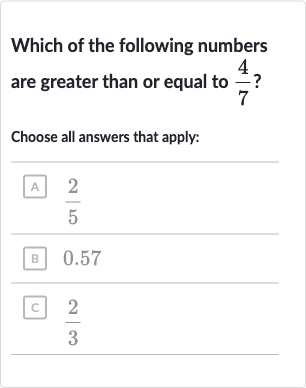Full solution
Q. Which of the following numbers are greater than or equal to ?Choose all answers that apply:(A) (B) .(C)
- Convert to decimal: Convert the fraction to a decimal to make it easier to compare with the other numbers.Calculation:
- Compare with option A: Compare the decimal value of with the decimal value of option A, which is .Calculation: Since is less than , is not greater than or equal to .
- Compare with option B: Compare the decimal value of with the decimal value of option B, which is .Calculation: is slightly less than .Since is less than , is not greater than or equal to .
- Compare with option C: Compare the decimal value of with the decimal value of option C, which is .Calculation: Since is greater than , is greater than .
More problems from Does x satisfy the equation?
QuestionGet tutor help

